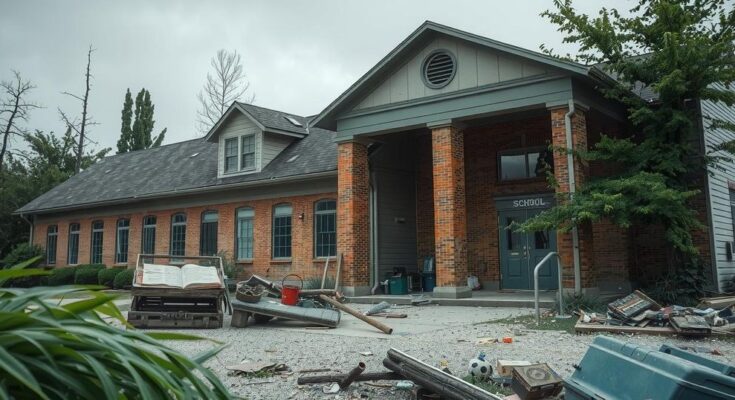Cyclone Jude has devastated northern Mozambique, affecting 20,000 children and damaging infrastructure, including schools and health facilities. An estimated 747,000 people, half of whom are children, are impacted by this event, exacerbating health risks from flooding. UNICEF is responding to this crisis, but resources are limited due to previous cyclones’ effects.
Recent reports indicate that Cyclone Jude has significantly impacted Mozambique, disrupting education for approximately 17,000 children. The cyclone, which struck Nampula on October 3, brought winds reaching 195 km/h and heavy rainfall. It has led to the destruction of infrastructure including schools, roads, and health facilities, leaving nearly 747,000 individuals, many of whom are children, affected by the devastation.
The severe weather conditions caused by Cyclone Jude have further complicated the already precarious situation following earlier cyclones, Chido and Dikeledi, which had destroyed over 150,000 homes, 471 schools, and 100 health facilities. The ongoing flooding raises the risk of waterborne diseases such as cholera and diarrhoea, greatly threatening children’s health.
Mary Louise Eagleton, UNICEF Representative in Mozambique, stated that the destruction of crucial infrastructure is depriving vulnerable children of essential services. While UNICEF is coordinating efforts to address the immediate needs of those impacted, resources are running low as they respond to multiple cyclones in a short period.
The situation remains critical as the cyclone’s aftermath continues to strain rescue and recovery efforts across the affected provinces of Nampula, Niassa, and Zambezia, highlighting the urgent need for assistance and resources to support recovery in these communities.
The impact of Cyclone Jude in Mozambique has been severe, with over 17,000 children deprived of education and many more affected by subsequent health risks. This disaster follows the devastation caused by previous cyclones and underscores the urgent need for support in recovery efforts. Continued collaboration between humanitarian organizations and the government is essential to address the needs of the affected population and restore essential services.
Original Source: clubofmozambique.com




